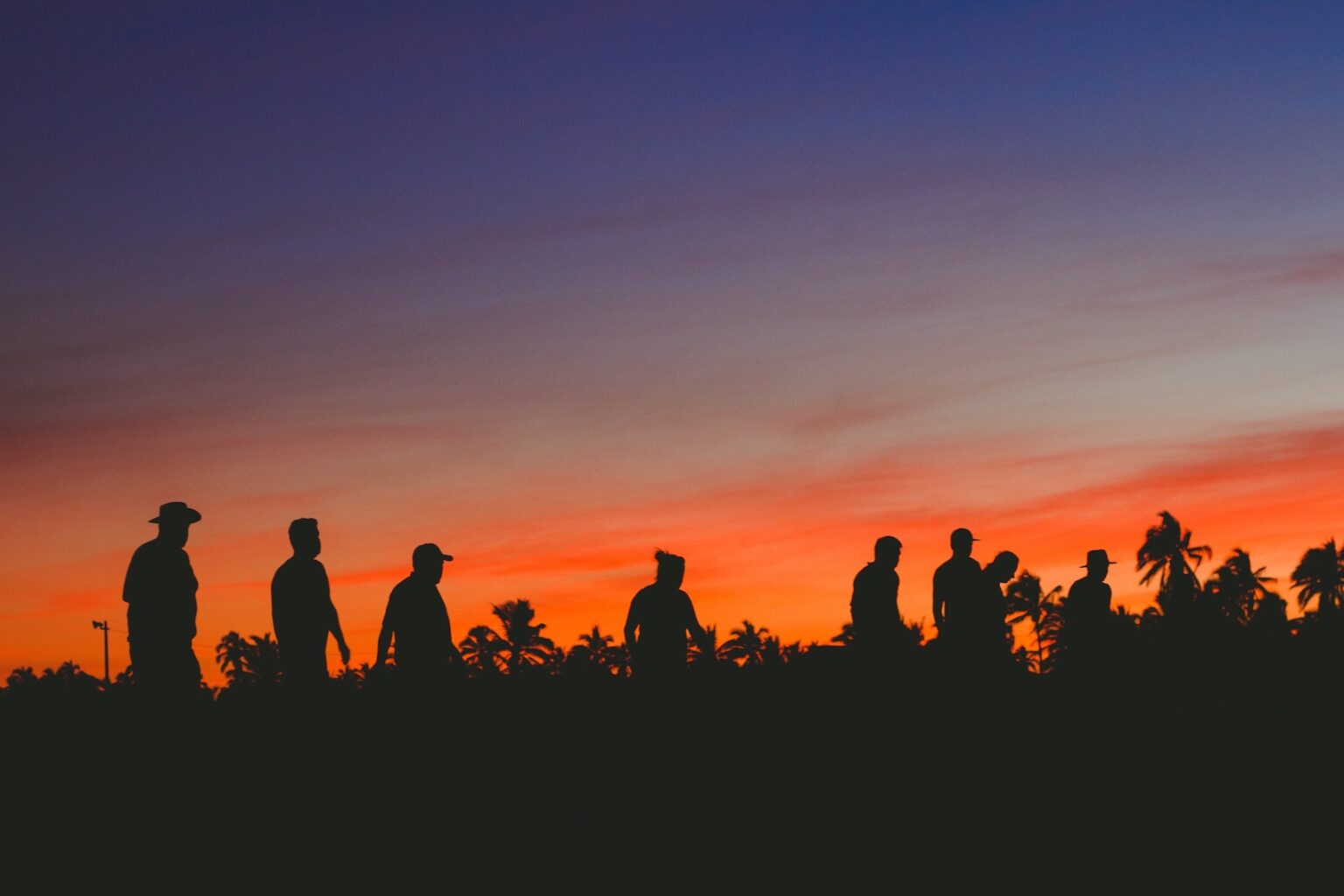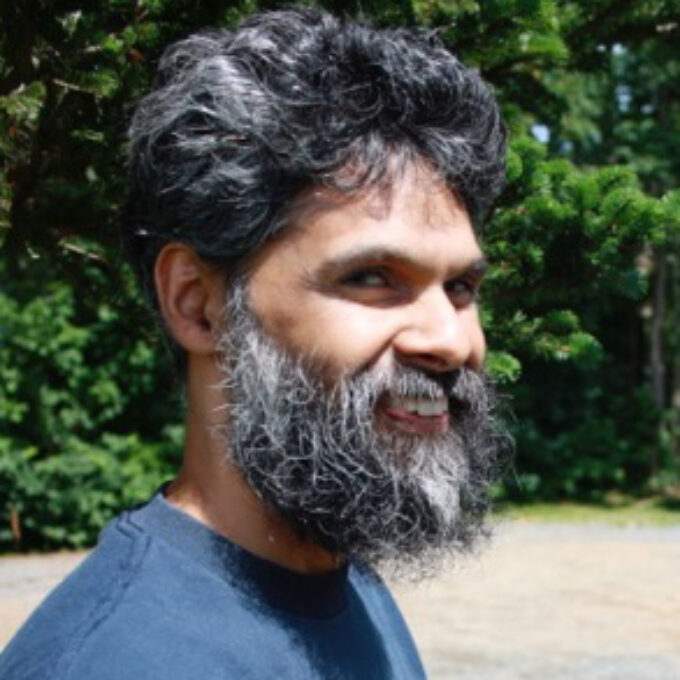Brian Braganza
T.O.N.E., Therapy Outside Normal Environments, is a group-based men’s mental health project, created by myself and Nick Cardone, a Counselling Therapist in Halifax. We take men out of the therapist’s office, and incorporate adventure and arts, re-connections to the land, and service to community, as ways and places that therapy can happen. Over three months we build meaningful connections and relationships, deepen inner awareness and self-reflection, provide new strategies and/or remind them of existing strategies which support their mental health.

It’s Sunday, the last day of our final T.O.N.E. weekend outing. I’ve drawn up an image of how I interpret Parker J Palmer’s concept of the Tragic Gap, on the flip chart. My rough drawing is a sort of canyon-like image with the Harsh Reality labeled on a ledge to one side, and the Life We Know is Possible on the opposing ledge, a vast deep canyon stretches between.
I share this concept of the Tragic Gap as a framework to help these men understand the paradoxical realities of their struggle with mental illness. Health isn’t a binary, it’s not like we’re either well or unwell, or unwell at one point and then one day become well when we take care of business. As Rachel Wurzman describes in her TedTalk about opioid addiction, we exist along a spectrum of what we consider as normal and well, and what is unwell.
Wellness and sickness exist at the same time within us, within all of us. Yet some of us may have more resilience, more resources, more capacity to hold our own distress along with our health. For these men, they won’t someday be miraculously cured of their anxiety, depression, or addictions. This is their Harsh Reality. And yet, in the three months we have been with this group, they have made tremendous strides towards wellness. Their motivation for healing is commendable and a significant factor allowing for their personal transformations to occur. This is the Life They Know is Possible, it’s not some far flung hope or wish, it is real and true. A life-line and way of being they have tied themselves that they can touch, hold on to, and throw to support others.
I’ve written in the CCR blog in the past about my work with men and boys to support them to live more into their wholeness. While not necessarily a Circle of Trust®, the development of the T.O.N.E. Project was greatly influenced by my work as a new Courage & Renewal Facilitator and many of the principles and practices of Circles of Trust® are embedded in T.O.N.E.
In 2015, through a generous grant from the Movember Canada Foundation, Nick Cardone, a Counselling Therapist in Halifax and I, designed the T.O.N.E. Project for men. Through this grant we delivered three successful groups followed by a final reunion session which brought members from each group together. We had approximately forty men complete the program with an attrition rate of 3%, which is generally unheard of in men’s mental health therapies.
It is difficult to get men to commit to therapy and to show up for their own self-care. In part this is due to the harmful messages of masculinity that persist in our society, messages that say, fix it yourself, don’t show weakness, and don’t show emotions. Nick often adds that it’s also the types of therapy that are available in the community that tend not to resonate with men in ways that work for them.
This new T.O.N.E. group has been funded by a provincial poverty reduction grant and is based in the community of Spryfield, just outside of Halifax. Spryfield is a fiercely proud community, it is also one that has been traditionally marginalized. While the Spryfield project still had the integral components of a T.O.N.E. group: residential retreats, service, reflection, time on the land we modified it slightly to meet the needs of a community-based group. With all the men coming from the same community we were able to build their capacity to connect to local resources, as well as build capacity of local agencies and individuals to assist the mens’ on-going journey towards wellness.
As we gather this afternoon to explore the Tragic Gap the men sit along three sides of the long table. I’ve invited them to sketch out the diagram in their journals, leaving space for notations. I explain who Parker J. Palmer is, his life work and writing with which he co-founded the Center for Courage & Renewal. I share some of the guiding principles of this work and process: We all have an inner teacher; Inner work requires solitude and community; Our brokenness is part of what makes us whole and authentic in the world. I reference that Parker openly writes and talks about his three periods with depression. I invite them to describe, on their diagrams, their personal Harsh Realities. To prompt them, I speak aloud some of what they have already shared through our time together: stories of adverse childhood trauma, sexual abuse, stories of violence to self and others, incarceration, social isolation, and addiction.
I then invite them to shift to the Life They Know is Possible, and invite them to describe where they have made a marked shift in their health and wellness during this program. I invite them to name those who support them, times they have been able to share openly about their pain, making life-giving choices such as taking healthy risks, standing up for themselves, connecting with each other, reconnecting with family and loved ones, reconnecting with themselves.
In the center of the canyon I draw a stick figure, arms extended towards both cliff edges, I describe that their work is to ‘hold the tension’ between the Harsh Realities and the World We Know is Possible. I describe that on occasion we may feel hooked, unable to escape our illness. In these moments we are dragged into the depths of corrosive cynicism while repeating some of the damaging behaviours of our mental illness. At other times we may have an exuberant feeling of wellness, it fills our head and heart with false promises of being normal, at these times we land in irrelevant idealism. I remind them that in this model, both are true and both remain with us, and the awareness of the pull from one side or the other helps keep us in the center. We are then able to hold the tension and stay in the action of moving towards our own wellness. As we wrap up this three-month program, their hard work continues. I ask them to consider what keeps them grounded, keeps them on their path to wellness, what practices, people, and places help them hold the tensions in their lives.
I share Palmer’s quote: “Violence is what happens when we don’t know what else to do with our suffering.” We consider that this model and their experience with this group of men and T.O.N.E. is an example of what they can do with their suffering when surrounded by a supportive and caring community. In this moment, a participant cracks open as he begins to share in a way he hasn’t in three months. In this moment he is able to trust, take risk and show his vulnerability. Most notable is the groups’ ability to be present and hold the space for his emotions and sharing without fixing, saving or advising. This space of being present in the moment for another’s grief, is contrary to the traditional models of masculinity and a demonstration of how far these men have come. This is a capacity that they did not have three months prior. In this unplanned moment we have dropped into a Circle of Trust as the community holds the space for this man’s inner work, and this man’s inner work enriches the community. Both are true.
As a result of the 2019 funding, we were able to create this documentary, Showing Up for T.O.N.E. that shares the voices of the men and the impacts on their lives. This shorter promotional video includes new footage from family members as they observed the changes in their partners, fathers and sons. And while there are some heartening comments and reflections from the men and their families, their work is not over. As in the concept of the Tragic Gap, we may not see a completion or resolution in our quest for wellness. And yet in recognizing and accepting that personal and social change are a journey, we are called to stay in the action to heal ourselves, each other, and our world.
In the midst of writing this post, there has been a horrendous mass shooting in Nova Scotia, committed, once again by a man. Years ago I knew and had worked closely with one of the twenty-two victims, she had two children.
This is not a new story, and yet it is a rare story in rural Nova Scotia where the killings took place. Here we have perhaps an idealistic view of community; where houses are left unlocked at night and keys are left in cars. In this time I’m called to hold my own Tragic Gap as the harsh reality of men’s violence is raw and heart-wrenching. In this time of my own grief I see myself flip out into the corrosive cynicism of how violence of all kinds is too common an outlet for men and boys in North America.
How can we deal with the suffering that some men incur, while recognizing that many men who are perpetrators of violence, are suffering themselves?
What are the limits of traditional therapeutic models to meet men in ways that work for them?
How do we disrupt the damaging effects that mainstream messages of masculinity have not only on men and boys, but on their partners, families, neighbours, and every aspect of peaceful society?

Brian Braganza is a Courage & Renewal Facilitator and experiential educator specializing in community development, masculinity, and youth engagement. He supports a wide diversity of youth and young adults to live into their vocational call and have meaningful roles and voices in their communities. Brian delivers experiential programs for men and boys, which builds their abilities to connect authentically and live into their wholeness.
We offer an abundance of resources to help you learn more about our approach and explore the ways in which our work has meaningfully impacted people’s lives.
There was a problem reporting this post.
Please confirm you want to block this member.
You will no longer be able to:
Please note: This action will also remove this member from your connections and send a report to the site admin. Please allow a few minutes for this process to complete.
